This Queer Mariachi Band Changed The Game For Good
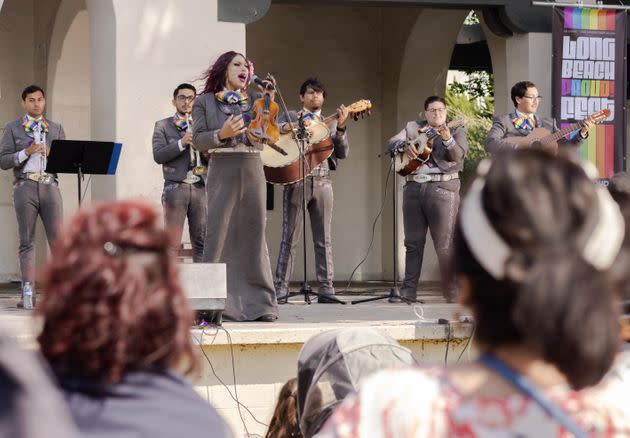
Band members of Mariachi Arcoiris, an L.A.-based group, and the world's first all-LGBTQ mariachi band, perform at the Long Beach Proud Festival in Los Angeles on May 20, 2023.
JoséAlfredo’sbeloved mariachi song, “Ella,” begins with a hearty lamentation: “Me canse de rogarle,” or, in English, “I’m tired of begging her.” It goes on, in Spanish, “I’m tired of telling her that without her, I’ll die of sadness.”
In the song, the female object of desire responds only to tell him that she is no longer in love. The man cries and guzzles tequila to soothe his heartbreak.
Like many mariachi songs, “Ella” is filled with both melancholy and humor and pregnant with cishet male angst accompanied by an inescapable tinge of entitlement. The song centers on the feelings of a man frustrated by the fact that he’s making an effort for a woman he believes owes him love simply because he loves her.
In the Mariachi Arcoiris, an L.A.-based group and the world’s first all-LGBTQ+ mariachi band, it’s always a woman who sings “Ella.” When a queer woman sings it, the tone takes on new depth. Now, the singer’s love could be unrequited for a whole set of different reasons. It’s one of the ways that Mariachi Arcoiris subverts a centuries-old genre that’s been traditionally sexist and homophobic, welcoming in those for whom mariachi music was not made.
Mariachi Arcoiris, as a concept, was birthed by Carlos Samaniego in 2000. At the time, he was a professional mariachi who experienced rampant homophobia in most groups he joined.
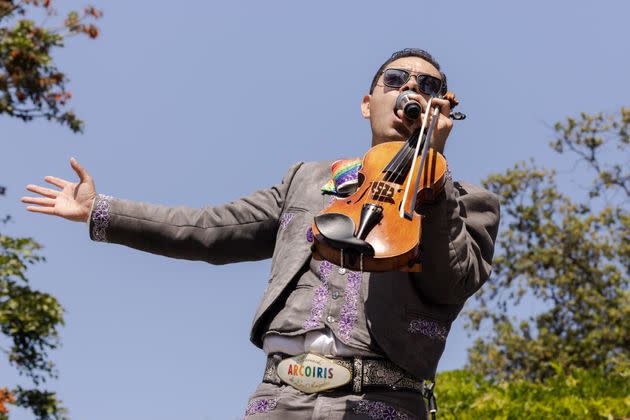
Carlos Samaniego, founder of Mariachi Arcoiris, an L.A. based group and the world's first all-LGBTQ mariachi band, performs at the Long Beach Proud Festival in Los Angeles on May 20, 2023.
It all came together one year during Pride while he was attending college at the California Institute of Technology in Los Angeles. The Gay and Lesbian Alliance staged a protest wedding at a time when same-sex marriage was illegal in much of the country — and they asked Samaniego if he could play mariachi music for it.
He had a better idea: He would scout other queer people and make an all-gay mariachi band. He put out some ads, and to his surprise, enough people responded to form a group. That’s when Samaniego realized that there were other gay mariachis out there who were equally desperate for community.
News of an all-gay mariachi band spread swiftly, and the Mariachi Arcoiris was booked and busy in gay venues throughout Los Angeles. But Samaniego was young, inexperienced, he tells me, and too focused on his studies. After a few months, Mariachi Arcoiris fell apart.
Samaniego kept playing mariachi for the next decade, but the homophobia never faded as he had hoped. He says he felt like he was playing a character during that time. There was “Work Samaniego,” who sang through the perspective of a heterosexual Mexican man, and then “Private Samaniego,” an openly gay man who lived in California.
But by 2014, he decided that he’d done enough compartmentalizing. It was the perfect time to bring back Mariachi Arcoiris. “Now I could really be who I was all the time,” he said.
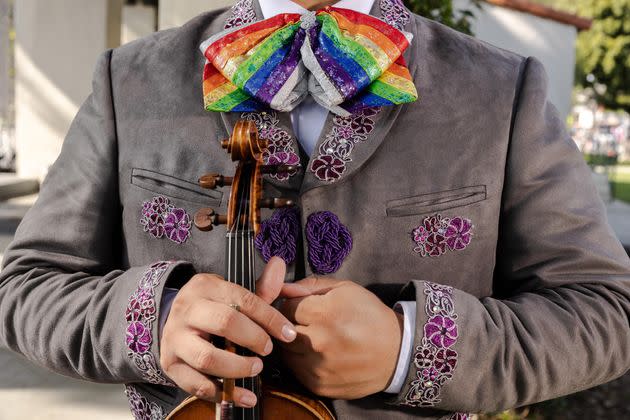
Close up details of Raul Vidal, member of Mariachi Arcoiris, an L.A. based group and the world's first all-LGBTQ mariachi band, after performing at the Pasadena Waldorf School Fund Raiser in Los Angeles on May 20, 2023.
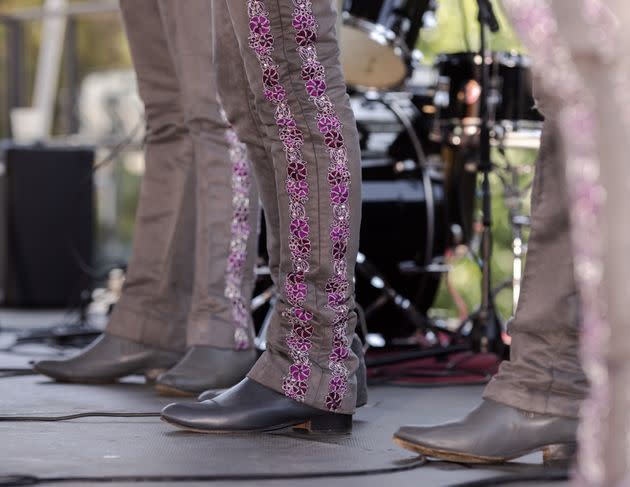
Clothing details of some of the member of Mariachi Arcoiris, an L.A. based group and the world's first all-LGBTQ mariachi band, during a performance at the Pasadena Waldorf School Fund Raiser in Los Angeles on May 20, 2023.
For those of us who grew up listening to mariachi music, we’ve known it to be a genre where men could express their feelings in a way that’s unacceptable in most other realms of Mexican culture. It’s a space where all your doors are open emotionally.
Although it’s easy to conflate this melodic vulnerability with an openness to homosexuality, the reality is more complex. The faces of the genre are singers such as the late Vicente Fernandez, a drunken playboy who was infamous for treating women like toys. The closest mainstream mariachi music has gotten to discussing queerness is in the incessant questioning of Juan Gabriel’s sexuality, to which he once famously responded, “What one sees need not be asked about.”
On TikTok, Mariachi Arcoiris has grown a fanbase of close to 50,000 people for whom seeing gay and trans mariachis is not just a novelty but something that the Mexican community desperately needs. Their very presence in the mariachi world challenges the patriarchy on which the genre was built, which has always centered on the feelings of straight men. By awarding that to queer people — the luxury to be enamored and subsequently heartbroken — gives us permission to take the romantic multitudes of queer people seriously.
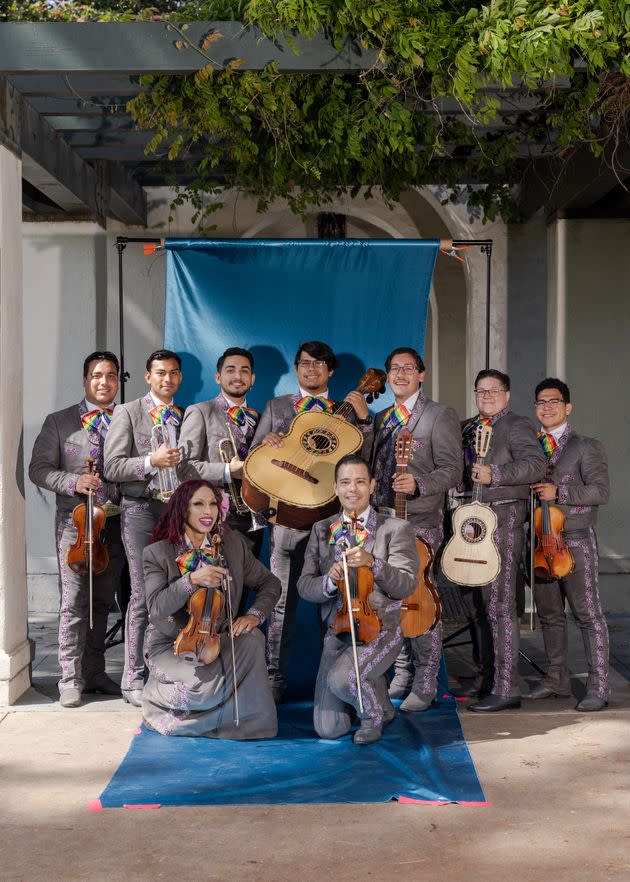
(Clockwise) Raul Vidal, Hector Castro, Jeremy Rodriguez, Saulo Garcia, Ricardo Dollero, Sammi Bautista, Edwin Martinez, Carlos Samaniego and Natalia Melendez, members of Mariachi Arcoiris, an L.A. based group and the world's first all-LGBTQ mariachi band, pose for a portrait at the Long Beach Proud Festival in Los Angeles on May 20, 2023.
When they play, the members of Mariachi Arcoiris wear rainbow bowties, ensuring that their queerness is visible whether people want to see it or not. Samaniego admits that it was a difficult decision for him at first. When he was growing up, presenting as queer was dangerous, and he felt uncomfortable at the thought of being so visible. On social media, even people have verbally harassed him by claiming that he’s desecrating the uniform and insulting Mexican tradition.
But the people who get it ― get it. He tells me that Mariachi Arcoiris once played at a nondenominational church, where the pastor introduced them as the first LGBTQ+ mariachi band in the world. Samaniego says that people gave them a standing ovation for several minutes, which brought him to tears. “They understood the weight of being queer and Mexican and playing the traditional folk music of Mexico,” he said. “They understood that, basically, this is historic.”
